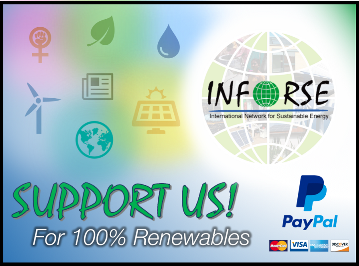|
|
|
|
|
|
|
|
|
|
|
|
|
|
|
|
|
|
|
|
|
| Follow Us: |
|
|
| Heat-Saving Jobs and Companies | |
|
By Adam Gula, Prof., Foundation for Energy Efficiency, (FEWE) Krakow, Poland A successful project shows how jobs and companies can be created to save heat in Polish municipalities. |
|
| Large Low-cost Potential | |
| Estimates show that about 30-40% of heat in the residential and tertiary sectors in Poland is wasted. Reducing this energy waste would lead to reductions of CO2 emissions and economic benefits to energy consumers, as saving heat means saving money. At the same time, it is obvious that energy is wasted most where there is no money for measures to save it. However, some heat-saving measures do not require big capital expenditures and are affordable for most building owners or users within their present financial resources. One example is that of repairs and draft tightening of windows, which costs 5-8 times less than installation of new, double glazed windows and – if done by an appropriately trained person – yields comparable energy savings with windows typical in Polish post-war buildings. Such work can be done by retrained unemployed people, resulting in significant savings and in new jobs. | |
| A Push is Needed | |
| As a rule, Polish municipalities do not have any plans or policies that would stimulate such development, e.g., by creation of small or medium-sized local enterprises offering these types of services. On the other hand, there exists a great human potential to create such small entreprises in Poland, based on the existing workshops or maintenance teams of housing administrations, which would only need some re-training and restructuring. A particular value of such entreprises would be that the jobs could be offered to people who are not necessarily highly skilled, which is the major problem in most of the high unemployment areas. However, it would require a push and an example to be followed. | |
| Project in 6 Towns | |
|
At the end of 1997, the Polish Foundation for Energy Efficiency (FEWE) obtained a grant from the United States Agency for International Development (USAID) for a three-year project aimed at demonstrating that the development of business providing low-cost heat-saving measures for buildings brings benefits to the local communities in several dimensions: • social (creation of new jobs, new economic activity, improved housing conditions) • economic (reduction of energy bills, avoidance of supply-side investment costs) • environmental (locally, by reduction of emissions from low chimneys) Six cities were selected for the project: Krapkowice, Luban, Olsztynek, Nowy Sacz, Trzcianka, and Bialystok. They represent different regions and population sizes (18,000–300,000). The involvement of the city government was an essential factor in the selection process. It was assumed that the USAID grant of $US 533,000 would be supplemented by $US 190,000 from the cities’ own funds. Additional support of $US 25,000 has been provided by the Small Grants Program of GEF for the City of Bialystok. In each of the cities, the project consisted of three main steps: * Complete audits of five typical buildings, identifying possible measures, their cost-effectiveness, and listing recommendations for low-cost improvements. * Actual implementation of the recommended measures in two buildings (a typical 4-5 story residential block and a school of a typical size), with on-job training of local technicians. The training was one of the two major goals of the project. For this purpose, in each city, 8-14 local workers were selected, typically from among unemployed people. * Pre- and post-demonstration data collection and analysis, to measure the actual savings. The work has been completed in five of the six cities. The sixth, Bialystok, is in the post-demonstration phase. The project ends in August, 2000. The results are very encouraging and prove that the project has addressed very important local problems. Over 80 local technicians have been trained by the project, and at least six small companies will be established by the trainees. An indicator of the success of the project is that, by the end of 1999, the cities had already exceeded their total contribution of $US 190,000. Another indicator of success is that three other cites, Miedzna, Brzozow, Bierun, decided to train their technicians similarly, covering the costs of the training from their own resources. In a follow-up project, technicians have been trained in Lviv in Ukraine, as well. |
|
| Adam Gula, more information | |
|
Adam Gula is a professor at the Faculty of Fuels and Energy, University of Mining and Metallurgy, in Krakow. He is also the director of the Polish Foundation for Energy Efficiency (FEWE). He has been one of the leading figures introducing energy efficiency in Poland. He is co-founder of FEWE and he was active in the foundation of INFORSE on behalf of the Polish Ecological Club. Photo text: Blowing-in insulation in an attic space. Photos by FEWE, Poland. More information: FEWE, ul. Florian-ska 55, 31-019 Krakow, Poland. Ph: +48-124213911, fax:+ 48-12411 9943 e-mail: adamgula@ceti.pl. |
|

| |
| Published in Sustainable Energy News |
|
|
Go back to main page of ISSUE #30 (683KB) 18 pages (2000-08-11) |
|
| Contact | |
| |
INFORSE Secretariat Klosterport 4F, 1. floor DK-8000 Aarhus C Denmark Phone: +45 86 22 70 00 BlueSky: INFORSE Facebook: INFORSE LinkedIn: INFORSE Web: inforse.org E-mail: ove@inforse.org |
